The living room is frequently called the "heart" of the home, and there is a good reason for this perception. It is the focus for friends and family get-togethers and fulfills several functions. A friendly and well-arranged living room may create an excellent first impression on visitors and help them feel at home.
The living room has many uses because it is such a flexible area. Its design and decor affect the home's overall appeal. A well-planned living room may give the entire home feel cozy, while a poorly constructed one does the opposite.
There are many things you can do in the living room, which can also serve as a workspace, a reading area, or a music room. Thus, giving it the right attention as well as an upgrade is always a good idea. Here are ways how to make this room more welcoming and elegant.
A lighting source, whether it be a floor, table, or ceiling lamp, may also make a statement. Consider using dramatic lighting accents like large lampshades, a glitzy gold lamp base, or a contemporary crystal chandelier. A space can have a high-style focal point with a shining finish or an enormous size.

The brass chandelier and table lamps in this room lend the black-and-yellow color scheme a striking, opulent radiance.
Budget Tip: Budget-friendly glamorous lighting choices are undoubtedly possible. You may find crystal ceiling fittings that cost less than $200. For elegant floor and table lamps, check big-box stores for striking designs that cost less than $100.
Mirrors are the ideal piece of furniture to add light, create the appearance of greater space, and give off a glitzy, luxurious vibe. A huge mirror over a sofa, credenza, or focal point, like a fireplace, should be hung.

In this white living room, a collection of simple, large mirrors creates a chic background for the white couches. It gives just the appropriate amount of glitz without giving the room the appearance of an ostentatious jewel box.
Budget Tip: Oversized mirrors don't need to be elaborate to look opulent. If a large mirror isn't available, consider clustering smaller mirrors to achieve a like look.
The larger the canvas or framed piece of art in the living room, the more upscale the space will appear. Large artwork gives an expensive-looking gallery appearance.

A regular white cabinet in this room becomes the focal point of the room thanks to a giant artwork painted in metallic gold. The striking black lamp adds even more drama to the wall.
Budget Tip: It can be difficult to choose affordable art that has a high-end appearance. It's challenging since art is individualized and subjective. Look through your local flea markets or online marketplaces like Chairish and Etsy for reasonably priced solutions. A huge original painted canvas or framed print usually looks more upscale than a giclée or printed canvas. Your living space can have a gallery-like atmosphere by using basic shapes and forms that you like, that provide drama, or a flash of color.
Your space will appear larger with a rug that can comfortably fit beneath all of your key pieces of furniture, including the coffee table, sofa, and armchairs. When trying to elevate the standard of design and elegance in a living room, this is crucial.
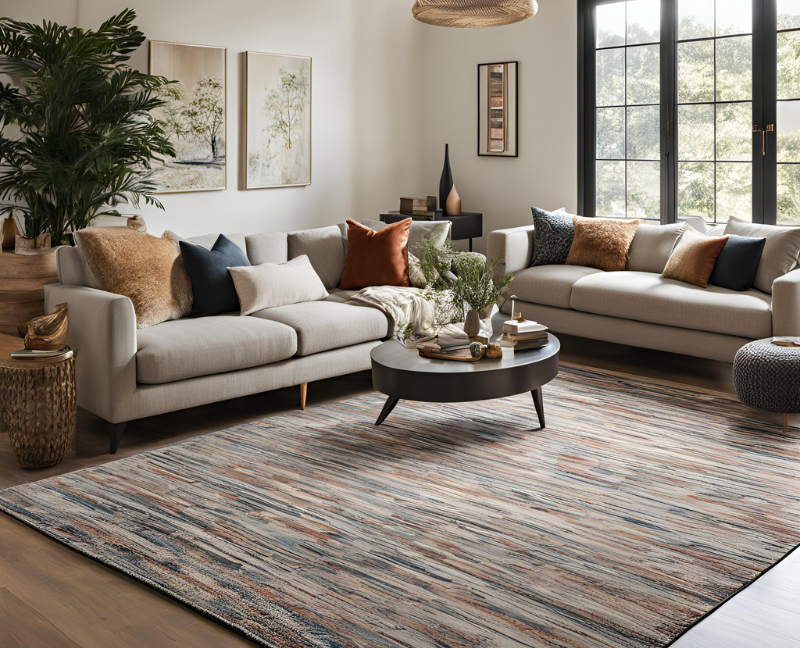
This area's huge carpeting highlights every piece of furniture. Its vastness allows the eye to move about and take in the room's expanse, which includes the colorful pouf and chic accent chair. This is how the room would appear if there was just a tiny rug beneath the coffee table. A modest size would resemble a bath mat and give the impression that the room is smaller.
Budget Tip: While sisal and jute are natural fiber carpets, they might be more affordable than large rugs. To give them a softer feel, they are occasionally woven with other materials. As an alternative, search for cozy-textured indoor-outdoor rugs.
Hang window coverings from the ceiling or as high up on the wall as you can. Elevated placement, a common characteristic in luxury living rooms, adds volume and offers the illusion of a higher ceiling.
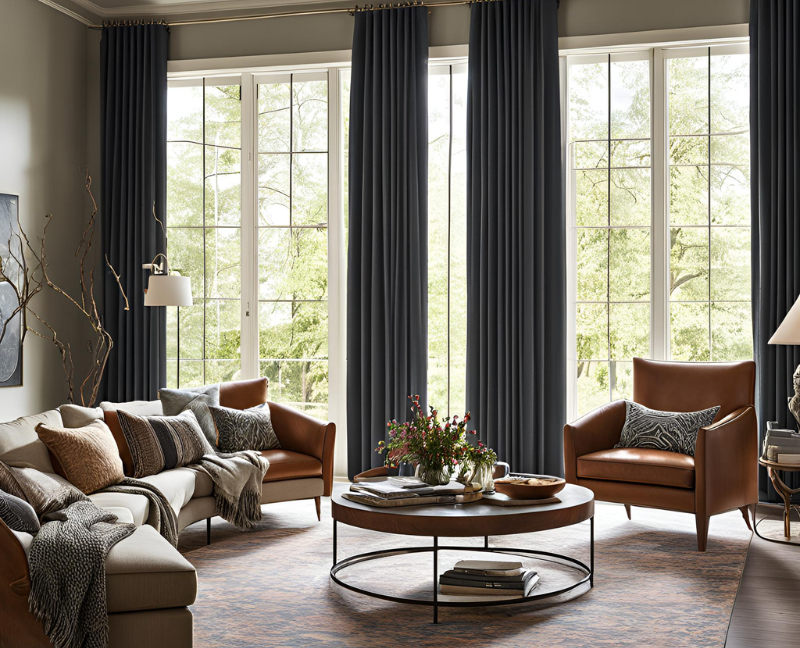
Budget Tip: If you can't afford pricey curtain panels, you may still give your space a more upscale appearance by hanging more of them, or doubling up on the panels. Most curtain materials appear more opulent when they have thicker bunched panels. You can also hide any subpar detailing or quality in your drapes by doubling the number. Even less expensive curtains typically look more expensive when they have a consistent hue and some texture.
It is possible to make your living room feel more inviting and comfortable without spending so much. All you have to do is add in a little creativity along with research.
As always, you can check our website to see more design inspirations.
Imagine spending a hot day reading a book or sipping a beverage while relaxing by your own swimming pool. Meanwhile, the children, laughing and playing on their pool floats or practicing their dive.
Having a pool at home has long been considered a perk that only elites usually have. However, while others see it as essential, others think it's a deal-breaker.
To find out if installing an in-ground pool is worth it or not, especially if it's the best way to boost home value, make sure to read the entire post.
In the meantime, if you want to know how to boost the value of your home, here are some other free resources:
In-ground pool owners may anticipate a 56% return on their investment, according to the National Association of REALTORS® Remodeling Impact Report: Outdoor Features for 2023.
When it's time to sell, your home's worth may rise by a maximum of 7%, according to HouseLogic. However, that all relies on several different things, such as:

The report stated that landscape experts calculated the price of constructing an in-ground pool to be $90,000. A conventional filtration system, three to seven feet of depth, and walls made of gunite (a mixture of sand, water, and cement) are included in the price mentioned. The pool measures eighteen by thirty-six feet.
The cost of installing an inground pool can range from $80 to $250 per square foot, or a total of $25,000 to $100,000, depending on its size and material. Not to mention, tailored renovations or additions will incur additional costs, such as lighting, a diving board or slide, a heater, and landscaping.
Additionally, to keep kids and pets safe around water and to prevent accidents, the majority of jurisdictions mandate the installation of safety elements including covers, enclosures, and fences. For example, the cost of pool fencing alone might range from $5,000 to $15,000.
Sanitation is necessary to keep bacteria and germs under control in your swimming pool, regardless of its style or composition. In order to maintain the right pH, alkalinity, and calcium levels, the water must also be balanced. These are just a few of the annual and monthly expenses that come with owning a swimming pool and can affect its value.
A pool structure is usually covered by a normal home insurance policy without the need for a separate rider. However, if you intend to build a pool on your land, think about speaking with your insurance provider about how having a pool can impact your premiums and raise your liability coverage. Furthermore, if you fail to install a pool fence, your insurance may refuse to cover your pool and your liability claim in the event of an accident occurring in your pool.
While installing a pool may raise your yearly property taxes in some places, it may not affect how much your house sells for.
The only person who can accurately assess the return on investment of a luxury purchase like a swimming pool is you, the homeowner. Whether it improves your quality of life by providing a space for leisure, relaxation, and memorable occasions is up to you to determine.
According to the NAR Remodeling Impact Report, homeowners who added a pool reported a "joy score" of 10 on a scale of 1 to 10, suggesting that the addition significantly affected their sense of satisfaction and achievement following the project's completion. Additionally, after adding an in-ground pool, at least 90% of respondents said they enjoy their time at home more. That can be difficult to quantify.
You live here at the end of the day. Go ahead, jump in, and enjoy the swim if you intend to establish roots, have the funds, and have thought through the advantages and disadvantages of building a pool.
Many people have false beliefs about leading an eco-friendly lifestyle, especially the notion that it's costly, difficult, and calls for a full head of dreadlocks.
Being green really isn't that hard; all it takes is one small adjustment at a time to benefit the environment.
And here's the huge bonus: You may frequently save money by implementing these tiny lifestyle adjustments.
Here are the eco-friendly tips for home that can help save money:
For most homes, energy costs represent a considerable monthly expense, and domestic energy use significantly contributes to environmental problems. Improving energy efficiency can substantially lessen your influence on the environment and electricity costs. Still, some of these improvements require much effort and money.
In addition to discounted costs for energy-efficient upgrades and appliances, several utility providers now give free energy audits and rebate programs. Look for deals you can take advantage of by first visiting the websites of your gas and electric suppliers. In addition, you can determine if you qualify for any federal income tax credits associated with energy conservation.
After exploring these promos and incentive programs, inventory your home for energy efficiency improvements and investigate low-cost renovations to reduce energy consumption:
Summer may be filled with more activities compared to other seasons, so it might require an effort to find enough time to clean, organize, and refresh your home. After all, doing so has environmental, financial, and even mental benefits for you and your family.
Here are some ideas for recycling, reusing, and reducing items that are already in your home:

There are many cheap, eco-friendly things you can do on your lawn that could have a beneficial impact on your finances and the environment, such as:
Plastic water bottles that are only used once are extremely wasteful and harmful to the environment.
Three times as much water is needed to make one water bottle as there are in one due to the plastic production process, yet an estimated 80% of them are not recycled!
Regretfully, they wind up in landfills or the ocean since individuals frequently neglect to recycle them correctly.
Purchasing a reusable, appropriately sized water bottle will solve this issue and allow you to carry it with you everywhere you go.
Long-term cost savings are also achieved by reusing water bottles since fewer plastic bottles will need to be bought.
Reducing your meat intake can actually have a significant positive impact on the environment.
Livestock operations occupy more than thirty percent of the Earth's surface.
In line with a UN research, “the livestock sector accounts for 9 percent of CO2 deriving from human-related activities, but produces a much larger share of even more harmful greenhouse gases. It generates 65 percent of human-related nitrous oxide, which has 296 times the Global Warming Potential (GWP) of CO2.”
Reducing your meat intake is a significant step in lowering your total GWP gas emissions.
We can enjoy and use more land for pleasure when there are less cattle on it.
Think about eating more fish or substituting veggies for some of your meat-heavy meals!
First of all, you don’t have to completely get rid of your paper towels; however, use them sparingly as much as you can.
Comparing the seven most popular ways for drying hands, researchers at Massachusetts Institute of Technology (MIT) discovered that using paper towels results in 70% more carbon emissions than using hand dryers with cold air.
Even though you most likely don't have a hand dryer at home, drying off with a cotton towel is 48% more environmentally friendly than using a paper towel.
When the time comes for your spring cleaning, chop up an old t-shirt and use it as a cloth instead of buying a dozen rolls of paper towels.
Since you were going to discard it anyhow, why not make financial and environmental savings simultaneously?
Gather all of your used rags into a basket and give them a quick wash.
Reuse, reuse, reuse!
Light switches are beside the door for a reason!
Turn them off whenever you leave a room, and especially when you leave the house. This will help you save energy and money on your energy bill.
Your ability to save energy by shutting off the lights will vary depending on the kind of bulbs you use.
An incandescent lightbulb is among the least energy-efficient forms of illumination available.
Just 10% of the energy used by incandescent light bulbs is converted to light; the remaining 90% is wasted as heat.
Therefore, you can save more energy in your home by turning off your incandescent light bulbs.
Since halogen lights employ the same technology as incandescent light bulbs, turning them off when not in use can also help cut energy bills.
It is also necessary to turn off compact fluorescent lights, or CFLs, according to the usual rule of thumb.
If you plan to be back in your room in fifteen minutes, you can leave the lights on.
But turning them off is more energy-efficient if you leave your home for longer than fifteen minutes.
Your CFL bulbs' lifespan will also be increased by using this technique.
Nevertheless, turning on or off Light Emitting Diodes, or LED bulbs, will not have an impact on them.
One of the key features of LED bulbs that makes them perfect for energy conservation at home is this.
Additionally, you can use sensors to turn them fully on and off instantaneously and to turn them on and off automatically.
Other than this, unplug appliances when you’re not using them.
Want more tips on taking care of your home and living an eco-friendly lifestyle? Why not check our free resources by clicking this link.
There is a growing need for eco-friendly, energy-efficient homes in this era of increased environmental consciousness. More and more purchasers are looking for properties that support sustainable and healthy living, are in line with their values, and provide long-term cost savings. Fortunately, building environmentally friendly, energy-efficient houses is now simpler than ever, thanks to technological developments and building techniques.
In this post, we'll understand the benefits of living in an eco-friendly home as well as its positive effects on both the homeowners and the environment.
Eco-friendly properties are mainly about creating a positive impact on the environment, but other than that, it's about aesthetics.
They contribute to reduced carbon emissions, conservation of natural resources, improved air and water quality, and preservation of biodiversity. Using renewable energy and energy-efficient technologies, eco-friendly properties play a significant role in minimizing climate change.
Additionally, eco-friendly properties conserve resources. Installing water-saving fixtures, rainwater harvesting systems, and energy-saving appliances saves up to 30% and 20-30%, respectively.
Eco-friendly properties also prioritize air and water purity. They improve indoor air quality and discharged water with modern ventilation, air filtration, and wastewater management systems.
The use of sustainable landscaping and green spaces in eco-friendly properties promotes biodiversity. Urban ecological equilibrium is maintained by native plant species and rooftop gardens.
Overall, environmentally conscious homebuyers seek eco-friendly properties due to the growing focus on sustainability. They are a good investment for a cleaner future because they cut carbon emissions, conserve resources, enhance air and water quality, and preserve biodiversity.
Eco-friendly properties boost the real estate industry financially and environmentally. These homes serve as great investments by helping owners save money on energy.
Solar panels, LED lights, and smart thermostats can reduce electricity costs in eco-friendly dwellings by 30% or more—your ethical investment in a sustainable future rewards you with financial security.
Eco-friendly homes and appliances qualify for tax breaks, and renewable energy technologies like solar panels receive financial incentives. Due to limited supply and rising buyer demand, these homes may command a 10% premium above conventional residences, delivering significant returns on investment.
Due to their durability and sustainable materials, eco-friendly properties require less maintenance and repair. This saves money on maintenance over time, making such homes financially beneficial. That said, buying eco-friendly properties benefits both the environment and the wallet.
Aside from creating a more appealing and healthy living environment, they provide homeowners considerable health advantages.
Here are the benefits of eco-friendly properties on health:
Pollution and insufficient ventilation cause poor indoor air quality in conventional dwellings. Eco-friendly properties reduce dangerous pollutants by using low-VOC materials and modern ventilation systems. Air filtration systems in these properties remove allergens, dust, and other contaminants, improving indoor air quality.
Eco-friendly homes use non-toxic materials during construction. They avoid formaldehyde, lead, and asbestos. Rooftop gardens and native plant species preserve urban ecological balance. Non-harmful materials eliminate the risk of long-term health concerns and allergies associated with conventional dwellings.
Comfort and well-being are prioritized in eco-friendly properties. Improving insulation, soundproofing, and natural illumination makes life more comfortable. Eco-friendly features also encourage natural and biophilic design, which reduces stress, boosts productivity, and improves health.
Eco-friendly properties conserve resources, reduce carbon footprints, improve air and water quality, and preserve wildlife. They also provide energy savings, tax benefits, property value increases, and long-term maintenance and repair savings.
The above information can answer why eco-friendly properties are the best option for buyers. Buyers should explore green investments due to their advantages and growing sustainability interests. Eco-friendly homes save money, the environment, and health.
Are you ready to upgrade your kitchen into a haven for anybody who enjoys cooking? If yes, do not look any further!
If you're considering renovating your kitchen, you should know what styles are trendy right now for this room that serves as the center of your home. Whether you want to make significant changes to your kitchen or a few adjustments, these creative renovation kitchen ideas will motivate you to think outside the box.
Here are nine renovation kitchen ideas you can think of if you want to upgrade your kitchen:
In recent years, many homeowners are choosing to open up the space in their kitchens. An entirely open-concept kitchen, where no wall divides the kitchen from an adjacent space, is the preferred design for 64% of homeowners remodeling their kitchens. Enhancing entertainment potential and increasing functionality are the two most often mentioned reasons for designing an open-concept area.
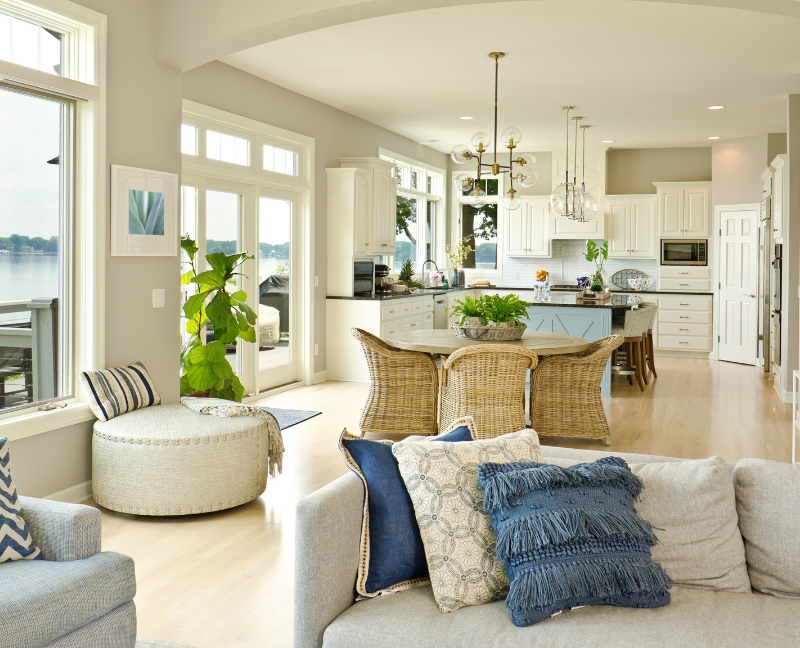
There are a lot of renovation kitchen ideas that involve substantial structural work, but most of them are centered on changing the room's design. 45% of homeowners upgrading their kitchens redesign the layout, and 43% modernize their systems. Alterations to the ceiling height and reorganization of the flooring are two examples of these modifications.
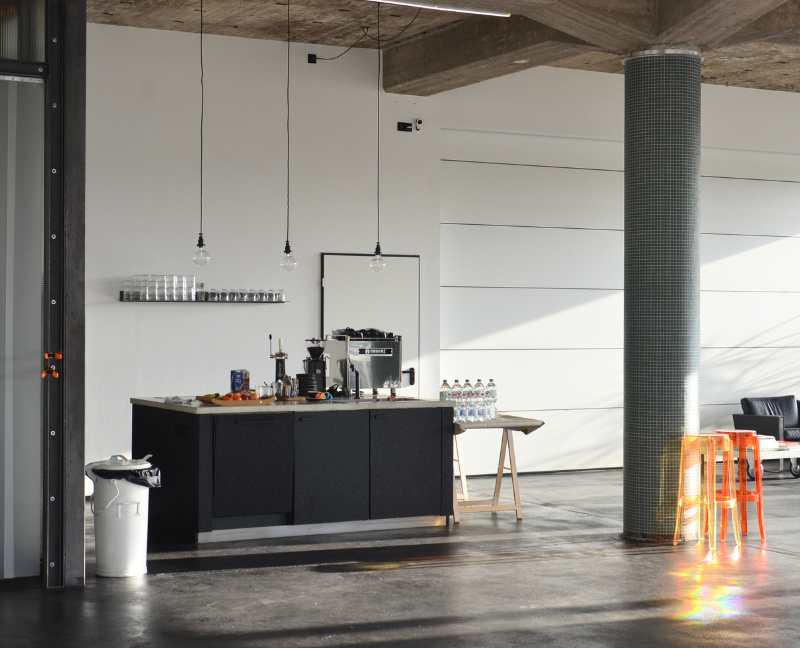
Appliances that are equipped with high-tech features are becoming increasingly popular among homeowners. Some homeowners upgrading their homes prefer home appliances connected to Wi-Fi.
In comparison, some choose devices that can be operated using a smartphone or tablet. Meanwhile, some homeowners would replace all their appliances simultaneously during a makeover rather than just a handful.
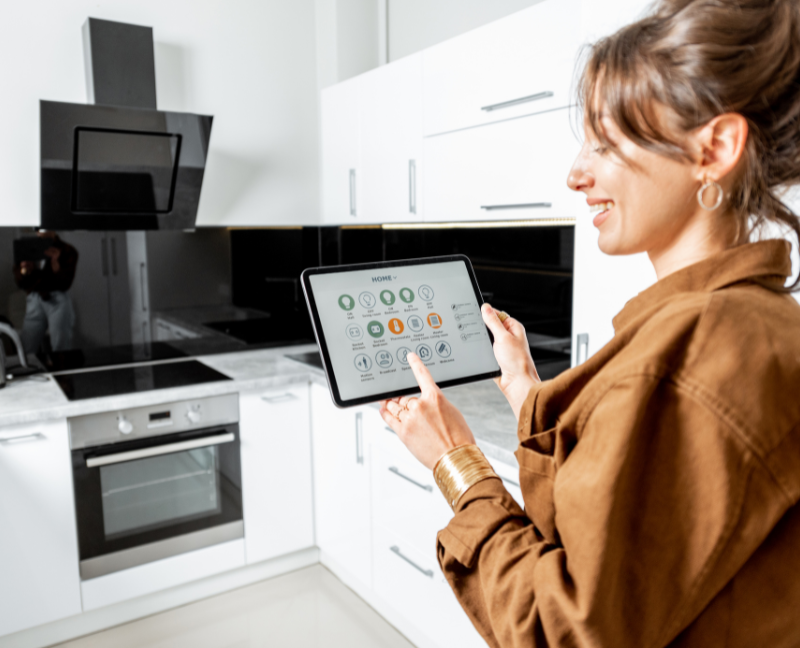
The most frequent reason given by homeowners renovating their kitchens is to meet the needs of elderly family members. A few suitable kitchen modifications for the age include rounded counters, pullout cabinets, more lighting, broad drawer pulls, and non-slip flooring.
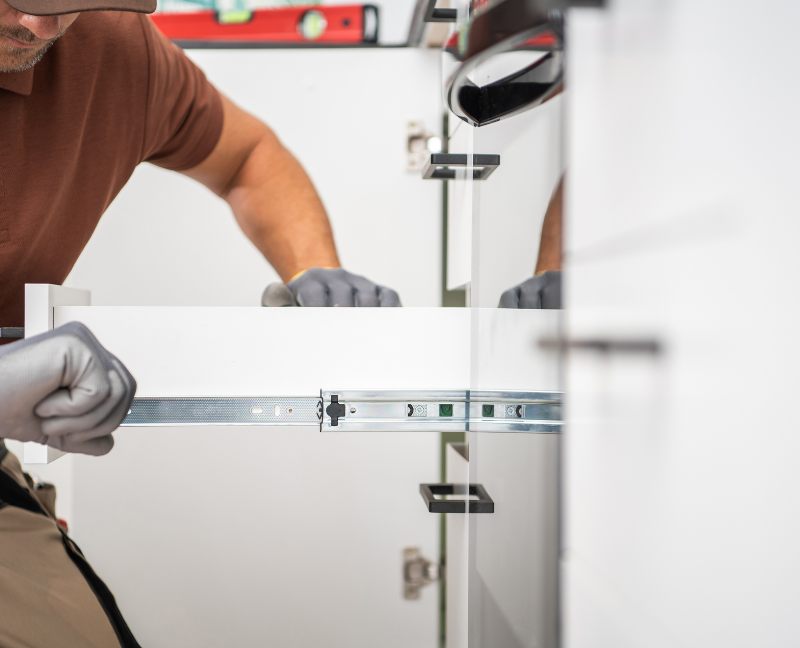
During a renovation, many homeowners change the backsplash in their kitchen. Engineered quartz is the most preferred material for backsplashes, followed by ceramic or porcelain tile. However, natural stone materials like granite, quartzite, and marble are equally popular among homeowners.
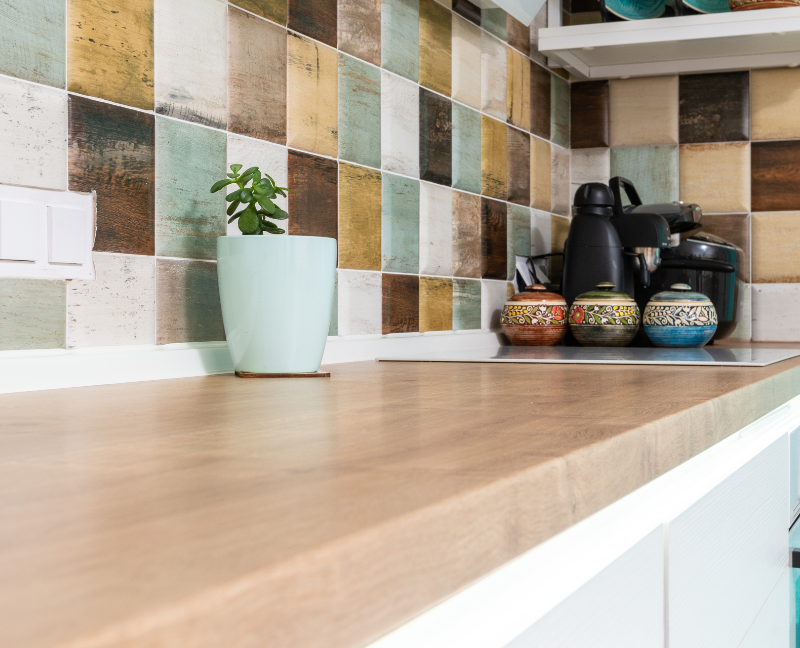
A larger kitchen island gives you more room for cooking and hosting guests, so many homeowners choose to expand their islands. Forty-two percent of homeowners remodeling their kitchens design seven-foot or longer kitchen islands.
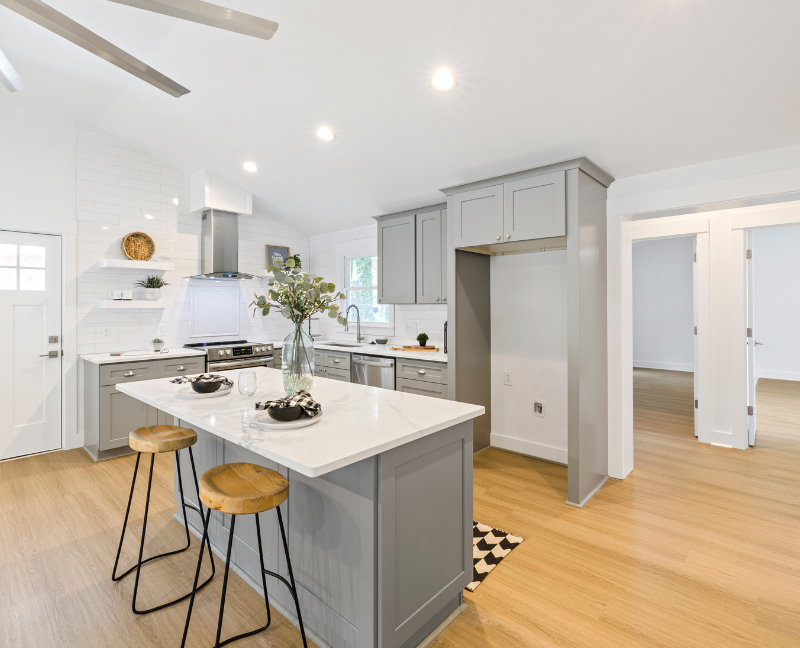
More color will be in the kitchen this year, especially on cabinets. Kitchen cabinets in wood and green are growing, but white is still the most popular. Wood tones are most famous for bottom cabinets, followed by blue for island cabinets.
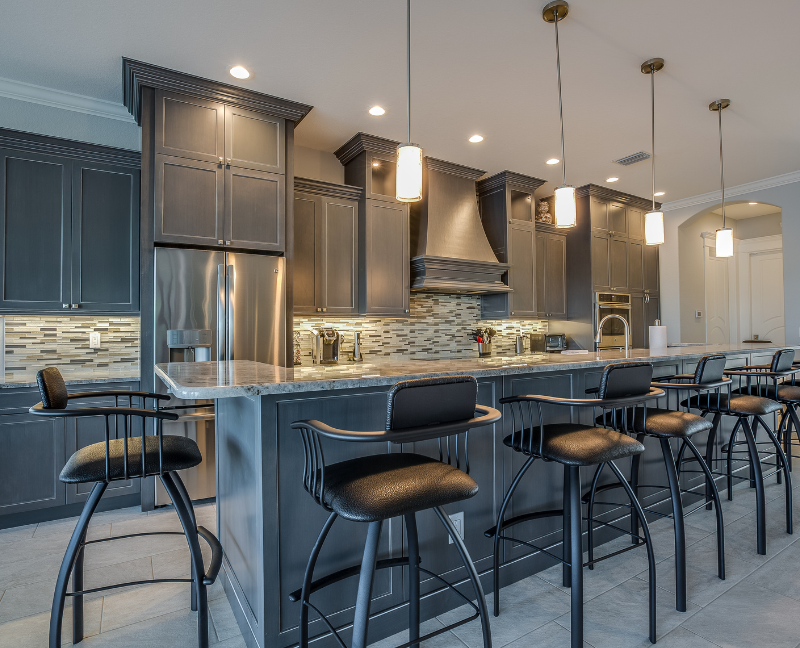
Organization is becoming increasingly important because people desire kitchens that are functional for them. Cutlery and utensil organizers, spice racks, and cookie sheet organizers are among the features that are becoming more and more popular.

Your kitchen's lighting creates a mood. Recessed lighting is still homeowners' first option when remodeling their kitchens. Some homeowners choose pendant lights, although under-cabinet lights are also trendy.

Check out these best kitchen renovation ideas to turn your kitchen into a gastronomic paradise. Elegant rustic themes to sophisticated modern designs fit any taste. Prepare to maximize the renovation kitchen ideas' beauty, functionality, and personal style.
Hiring a professional "stager" to prepare your Indianapolis homes can be expensive, but if you know some tricks, you can make your property very appealing to potential buyers.
In this post, we are going to give you a few tips on how to improve your Indianapolis real estate with a very low investment.
Home staging is the art of getting your home ready before putting it on the market. This technique is done to increase the property's apparel and reduce the listing time by up to 50%.
The act of putting a property's best attributes on display and creating a welcoming and appealing environment for potential purchasers is known as home staging.
It entails several methods, including organizing, depersonalizing, organizing, and improving the space's aesthetic appeal.
Highlighting the property's advantages, realizing its full potential, and leaving a lasting impact on potential purchasers are the objectives.
Shorter Time In The Market: Compared to unstaged homes, well-staged homes typically sell more quickly. Presenting your home in the best possible light will draw in more interested parties and instill a feeling of urgency.
Emotional Bond: Staging forges an emotional bond between purchasers and the real estate. You may arouse favorable feelings in potential purchasers and help them see themselves living in the place by presenting a lifestyle and creating a welcoming atmosphere.
Enhanced Marketability: Staging makes your house stand out from the competition in a competitive market like Indianapolis. It draws in more potential buyers by making your house stand out in internet listings and during showings.
Higher Home Value: Homes that have been staged frequently sell for more money. Buyers are willing to spend extra for a well-staged home because they believe it to be more valuable.
Optimizing Space: By using staging, you can increase the impression of available space in your house. You may create the illusion of larger, more practical spaces by carefully placing furniture and using the right lighting.
Professional Image: A home that has been staged expertly conveys that it has been well-kept and cared for. Customers may feel more confident because of the professionalism and attention to detail it exudes.
Potential Highlighting: Your property's potential is brought to life through staging. It encourages consumers to see the potential and see their own life in the house by assisting them in visualizing how they may use the space efficiently.
Replace old items with new ones. It is important to know that too much furniture will make your space smaller and it will contribute to the cluttering of your Indianapolis homes.
Minimalism is popular everywhere in the world. You would be surprised how bigger your home looks, just by getting rid of some excessive old furniture. By repositioning furniture in a cozy conversational way, your dayroom will benefit in both ways: visually and practically. It will make your place look bigger and it will also make your space more user-friendly by allowing your visitors to walk freely.

Use a variety of lighting, such as desk lamps, dayroom light stands, kitchen counter lights, overhead lights, etc.
Your house in Indianapolis would look more appealing and welcoming if you bring enough lighting to it. Of course, nothing beats the sunlight so be sure to open your windows and bring more natural light into your home.
Each color refers to something specific. If you paint your room green, it will reflect the color of nature. By painting the walls in the same color as your drapery, you are going to create an illusion of the space being bigger. If you like darker colors, it is recommended to use them in the bedroom or dining room, since the dark color creates some sense of more intimate and private space.
All the things made of wood will look like new if they are professionally painted. Repair your wooden sidewalk and door, and add some more wood where it would bring a cozier look. Some items, such as candles go well with wood. Meanwhile, you can have floors refinished if needed.
When it comes to stating your yard, use the same techniques utilized when staging indoors, such as:
You may also add exterior lighting and some pretty flowers that will reflect cheerful colors and bring a smile to your potential buyer’s face.
Get rid of excessive stuff in your closets, especially ones that don’t look presentable. Leave closets open and half empty.
By doing so – you will leave the impression that your home has more closet space than you need. If needed – rent some storage space. Believe it or not, some people even make final decisions based on closet space.
All of us love clean house, but some of us do not have time or will to keep up with it.
Hiring some cleaning professionals is not a big investment, but it will create an impression that your home in Indianapolis has been well maintained. Get a carpet cleaning done by professionals as well.
These are some of the tips we've used over the years to help our home sellers sell their homes fast. However, you have to know that each home is different; find out which techniques will work according to your situation, and feel free to explore more.
As always, we are more than happy to assist you so if you have any questions on selling or buying a home, you may drop them in the comments.
Thank you!
When looking for Indianapolis homes for sale, it's important to keep an eye out for problems that may cost an arm and a leg to repair once you've purchased the property. The first thing you need to do before committing to buying a home is to have it examined by a licensed home inspector that you trust.
An inspector will alert you to any major issues that might prevent you from buying a home as well as minor issues that you might be willing to fix yourself after the purchase. With a report on the current state of the home in hand, you'll be more prepared to negotiate with the seller, and you'll also have the information you'll need to walk away from a property that will demand costly fixes.
Types of repairs that you should probably try to avoid include major issues that can affect the livability or safety of the home. For example, replacing the roof can be an extremely costly repair that might need to be done before you're able to move in. Major plumbing fixes can also be expensive and painful to deal with.
Considering this, don't forget to have someone look at the pipes before making any final decisions about buying a home. You'll also want to have your inspector thoroughly go over the foundation of the property. If there is a crack in the foundation, the cost to repair it will usually be quite significant. On the other hand, if not repaired, it can pose serious problems for your home in the future.
Remember, a home doesn't need to be in absolutely perfect condition in order to be a good buy. Some buyers like finding fixer-uppers that they can make their own. For example, if you are interested in building the kitchen of your dreams, it may not matter what the kitchen looks like right now, but only how much space it has to offer.
If you're not particularly interested in performing any serious remodels, look for homes that are in good shape and won't require much work to make beautiful. For example, repainting the walls and updating the fixtures are both relatively low cost and simple tasks that can dramatically improve the look and character of a home.
Nonetheless, here are the most common problems to look for when purchasing a new property:
Starting outside and going inside, – from ground up to the ceiling and roof, check every corner of the home properly. Although you’re likely to work with a professional, you can come up with a rough idea of the home’s condition. It might help asking yourself these questions;
Are there visible cracks?
What is the condition of the wall?
Does the interior look compromised?
Are there broken pipes?
What is the condition of the roof?
Make a list of all the possible questions before visiting the property and answer each as you examine the home meticulously.

All rooms in the house, including the kitchen, bathroom, and storeroom, should have adequate ventilation and airflow. A healthier and happier family and fewer microbiological growth result from the house staying fresh and having less moisture growth inside.
Make sure you inspect a home's plumbing system when you go to inspect it. Although they are hidden gems within the house, they are a crucial and indispensable component of a cozy living space. Issues might arise from outdated plumbing systems in older homes. One possible cause could be a leak in the plumbing system or rust. Verify that the water is flowing properly and that all of the plumbing lines are in good shape. Additionally, you might look for potential plumbing errors if it's a new house.
Ensure that the house receives enough sunshine. Sunlight is crucial for maintaining a fresh atmosphere in the home. It keeps your home odor-free and naturally eradicates germs and other microorganisms. In addition, it promotes healthy plant growth in your garden and keeps the house warm in the winter.
Verify if the house has enough water supplies. Water is essential to every home. The main sources of water were once hand-dug wells, but nowadays the main sources are government water delivery lines and well drilled wells. It will be tough to obtain clean water at your home if these are not included in the house you buy.
If you’re looking to purchase Indianapolis Homes, it’s always wise to work with an experienced real estate agent, like the agents at RE/MAX Advanced Realty. By working with us, you’ll not only find homes that are well-suited to your individual needs, but also avoid properties that demand costly fixes and repairs.
Real estate has widely adopted sustainable and eco-friendly techniques in recent years.
From residential properties to commercial establishments, green features have proven their benefits. Sustainability improves the environment, tenants' quality of life, and long-term costs.
Determining the importance of sustainability in real estate involves both strategic investment and environmental responsibility.
Green techniques frequently result in long-term cost savings and enhanced property values. Environmental duty consists of minimizing carbon emissions and protecting natural resources.
This post discusses the growing popularity of eco-friendly and sustainable real estate characteristics, including green building methods, energy-efficient appliances, renewable energy sources, and eco-conscious architecture.
Sustainable living has grown due to environmental awareness and the desire for energy-efficient and environmentally friendly lives. Due to this paradigm shift, real estate developers, architects, and homeowners now prioritize sustainability. Sustainable building strategies reduce these negative consequences by using eco-friendly materials, minimizing energy use, and using renewable energy.
Here are the essential details you need to know about sustainable real estate;
Green building practices contain many strategies to reduce buildings' environmental footprint while promoting occupant health and comfort. These practices include energy-efficient design, sustainable materials, and others.
Energy-efficient buildings use enhanced insulation, high-performance windows, and efficient HVAC systems to save energy and reduce fossil fuel use.
Additionally, green buildings use natural ventilation, low-emission materials, and air filtration to enhance indoor air quality. Better indoor air quality improves health, productivity, and well-being.
Besides sustainable building principles, green real estate uses energy-efficient appliances and fixtures. Refrigerators, dishwashers, lighting fixtures, and plumbing fittings that use less electricity and water reduce utility expenses and environmental effects.

Sustainable real estate relies on solar, wind, and geothermal electricity. Buildings may use less fossil fuels and help clean up the electricity grid using renewable energy.
Low costs and generous incentives have made solar photovoltaic (PV) systems popular in residential and commercial locations. Systems that turn sunlight into electricity power homes and businesses with clean, renewable energy.
Wind turbines, geothermal heat pumps, and solar PV can generate sustainable energy on-site. Property owners can lessen their carbon footprint by investing in these systems and earning net meters and renewable energy credits.
Beyond renewable energy and energy efficiency, eco-conscious design is essential to sustainable real estate. There are several features and initiatives to reduce environmental impact and improve user comfort and well-being.
Native landscaping increases biodiversity and takes less upkeep than lawns, while green roofs and rainwater harvesting systems manage stormwater runoff and minimize water use.
Recycling and reusing materials in construction and interior design reduces waste and carbon emissions. Reclaimed wood flooring and recycled glass countertops provide character and charm while reducing environmental effects.
Together with green features, green certification, and standards are crucial to real estate projects. Several organizations and projects have set sustainable building standards for developers, architects, and homeowners.
A stage toward a more sustainable environment is the importance of sustainability in real estate. From green construction techniques to energy-efficient appliances, renewable energy sources, eco-conscious design, and green certification and standards, sustainability has many benefits.
As demand for sustainable living rises, so will green features in homes and businesses. Sustainability and green certification in real estate development and restoration projects may build healthier, more resilient communities and protect the earth for future generations.
Typically, a traditional house is constructed of brick or stone, has a roof that is designed to keep the rain out of the building, and includes an electrical system. But as millennials enter the home market, the standards are starting to shift, and they are spearheading the development of "wellness-minded" structures.
Although they initially cost slightly more than traditional homes, eco-friendly homes ultimately save you money. It provides quality living space and more benefits for you and the environment.
Beyond the immediate advantages of reduced environmental impact, these homes offer a compelling offer for homeowners: long-term cost savings through eco-friendly ways to save money.
Eco-friendly homes are designed to be as self-sufficient as feasible and have as little impact on the environment as possible.
Sustainable houses use a variety of natural resources, including earth, wind, and light, to minimize their carbon footprint and drastically cut down on the amount of heat and electricity that a homeowner uses.
As we grapple with climate change, resource shortages, and environmental damage, eco-friendly homes are a practical solution. While the upfront costs may seem significant, the "eco-friendly ways to save money" offers that can lead to substantial savings over the property's lifespan.
Eco-friendly homes provide a high-quality living space and help you to save money. An environmentally friendly structure can reduce the amount of water and energy used by 30–50% and 30–70%, respectively. Living in a green building can save money on power and air conditioning.
A well-designed space, for instance, requires less air conditioning. When accounting for these savings, green buildings can be significantly less expensive. More green materials and consultants are currently needed.
Thus, although an eco-friendly home may seem expensive, you shouldn't be worried. Building full-cycle costs increase insignificantly. Eco-friendly insulation and hypo-thermal glass cost 5-8% more. The increased cost can be recouped in 3-5 years due to considerable savings.

Eco-friendly homes aren't limited to those who build themselves. Builders are offering more "eco-friendly" apartments and villas as awareness develops.
Living and working in an eco-friendly environment will gain popularity as customers learn about its benefits.
Eco-friendly buildings are rated on numerous criteria before being green:
Sustainable homes are not a carbon footprint lifestyle statement. Many builders use green ratings and certificates to market their properties.
Not all "green" or "eco-friendly" properties are because they have lawns and gardens; many small and mid-sized builders term their projects eco-friendly.
Checking rating agency certification when buying a "green" home will assist you in spotting a greenwash.
Here are the several eco-friendly ways to save money:
Eco-friendly homes provide quality living space and lower utility bills while saving money over time. In addition, having an environmentally friendly home can help you obtain financing at more favorable interest rates.
These eco-friendly ways to save money encompass features like sustainable building materials, renewable energy sources, and effective insulation, among other eco-friendly cost-saving measures.
Community gardens and real estate are integrating beyond greenery in metropolitan areas. Adding green spaces to real estate developments improves aesthetics and benefits people and the community as cities grow.
One crucial aspect to consider is the environmental benefits offered by community gardens. Are community gardens good for the environment? In this post, we will help you understand what community gardens do in the environment.
"Are community gardens good for the environment?" -- that's one of the frequently asked questions about community gardens. To answer this, you must first understand what a community garden is.
A community garden is a piece of land cultivated by a group of people. Vegetables and flowers are usually grown here individually or collectively. As a result, it helps improve physical and mental health and nutrition in the community.
A green revolution is quietly growing in urban settings with skyscrapers and busy streets. Growing concrete jungles requires additional green places. Amid urban chaos, communal gardens promote sustainability, community solidarity, and property values.
As green oases in urban settings, community gardens profoundly affect mental health, encourage sustainability through operations, and are increasingly valued as eco-amenities by real estate developers.
Community gardens bring nostalgia and nature to city dwellers, providing a refuge from city life. The emotional allure of these natural areas goes beyond aesthetics, affecting well-being and belonging.
Community gardens are essential for promoting mental and emotional health, creating a sense of community by bringing people into contact with nature in urban areas, and encouraging personal growth narratives through shared gardening experiences.

Community gardens increase real estate values and resident well-being. Developers realize that community gardens can boost property prices and increasingly embrace green facilities.
Growing community gardens are being used as selling factors in marketing efforts, and the demand for homes close to green areas is a sign of beneficial effects on property values, in line with real estate trends emphasizing sustainability and green living.
Community gardens serve as a platform for sustainable practices and allow locals to cultivate their food. These green areas become centers of environmentally conscious activities that improve the environment and teach the local population sustainable living practices, such as composting and rainwater collection.
Community gardens are essential to urban farming and self-sufficiency. They promote sustainability in urban environments through educational initiatives, rainwater gathering, composting, waste reduction, and water-saving techniques.
Keeping real estate and green spaces in balance is tricky as demand rises. Collaborative urban planning efforts, encouraging developers to include green amenities, and encouraging community involvement in decision-making processes are all necessary to balance the requirements of inhabitants and the demands of real estate development.
Community gardens in real estate serve emotional, social, and environmental demands in the ever-changing metropolitan setting. Green spaces and real estate create value in urban environments and a more sustainable and peaceful future.
The effects of community gardens on urban real estate include increased property values, environmental sustainability, and communal well-being. Developers are interested in how community gardens provide value, livability, and resilience to urban surroundings.
As we cross the urban jungle, you may know how these community oases affect property values and quality of life. Solutions must balance concrete with vegetation to preserve urban ecosystems for the next generations.

8313 W. 10th St
Indianapolis IN 46234
dennis@indyhomepros.com
317-316-8224